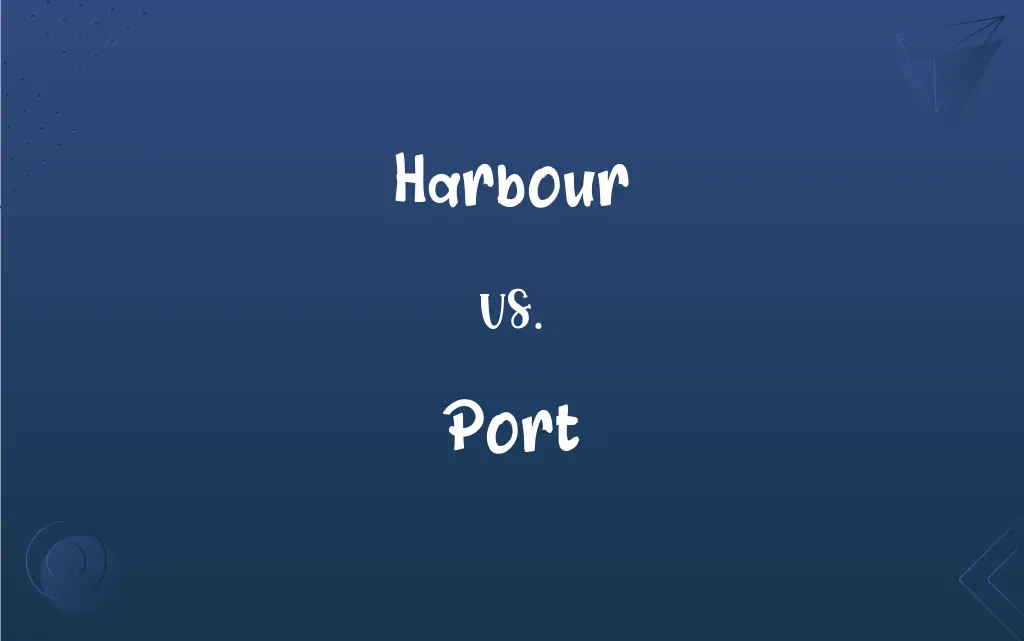Harbour vs. Port: What's the Difference?
Edited by Aimie Carlson || By Harlon Moss || Updated on July 30, 2024
A harbour is a sheltered body of water where ships can anchor safely, while a port is a facility on or near a coast for loading, unloading, and accommodating ships.

Key Differences
A harbour is essentially a natural or artificially made shelter where boats and ships can take refuge from storms and rough seas. It provides safety and protection to vessels from the tumultuous waters. Conversely, a port is a man-made or natural facility constructed specifically for shipping activities like loading, unloading, and docking. It might be equipped with warehouses, cranes, and other infrastructure.
All ports are typically found within or adjacent to harbours, but not all harbours have ports. A harbour might simply be a naturally protected cove or bay where ships can anchor without any facilities for cargo handling, while a port is deliberately established to facilitate maritime trade and has the amenities to do so.
The main function of a harbour is to offer shelter. It's a haven where vessels can seek refuge in unfavorable weather conditions. In contrast, a port serves as a commercial point, facilitating the exchange of goods and sometimes passengers, and is often equipped with cargo-handling equipment, storage areas, and sometimes even customs facilities.
It's possible for a harbour to exist without any significant human-made infrastructure. It might simply be a region of the sea protected from rough waters by natural features like islands, peninsulas, or reefs. On the other hand, a port implies a certain level of infrastructure development, designed to support the transfer of cargo and people between land and sea.
Geographically, harbours can be formed by various natural features, such as bays, estuaries, and sounds. They primarily focus on the safety of the vessels. Ports, however, are characterized more by their facilities and utilities which make trade, cargo transfer, and sometimes passenger movement possible.
ADVERTISEMENT
Comparison Chart
Primary Function
Provides shelter to vessels
Facilitates loading, unloading, and docking of ships
Infrastructure
Might not have significant human-made infrastructure
Contains facilities for trade, cargo, and passenger movement
Location
Formed by natural features like bays, estuaries
Typically found within or adjacent to harbours
Trade & Commerce
Not necessarily designed for trade
Specifically designed for maritime trade and commerce
Anchor & Dock
Ships can anchor
Ships can both anchor and dock
ADVERTISEMENT
Harbour and Port Definitions
Harbour
Harbour is a sheltered area for ships.
The ship found safety in the harbour during the storm.
Port
Port is a facility for loading and unloading ships.
Goods from all over the world arrive at the port.
Harbour
Harbour is a place offering protection from rough waters.
The boats stayed in the harbour until the winds subsided.
Port
Port is a place where ships dock and transfer cargo.
The city's port is always bustling with activity.
Harbour
Harbour can be a coastal inlet providing shelter.
The fishermen docked their boats in the small harbour.
Port
Port refers to a maritime commercial facility.
The country's major port facilitates a huge volume of trade.
Harbour
Harbour is a natural or artificial refuge for vessels.
The city has a deep-water harbour suitable for larger vessels.
Port
Port is a harbor town or city where ships load or unload.
The cruise ship will dock at the island's main port.
Harbour
Harbour may be a haven for marine vessels.
The island had a picturesque harbour surrounded by cliffs.
Port
Port is an establishment for receiving ships.
The port has modern equipment to handle containers efficiently.
Port
A place on a waterway with facilities for loading and unloading ships.
Port
A city or town on a waterway with such facilities.
FAQs
Are all harbours also ports?
No, while many harbours have ports, some harbours may simply be natural shelters without any facilities for ships.
How do you spell "harbour" in American English?
In American English, it's spelled "harbor".
Are ports always located by the sea?
No, ports can also be found on rivers and lakes.
What's a "safe harbour" in financial terms?
It refers to a legal provision to reduce or eliminate liability as long as certain conditions are met.
Are harbours always man-made?
No, while some harbours are enhanced or expanded through human intervention, many are natural formations.
Can "harbour" be used as a verb?
Yes, it can mean to give shelter to or to hold a thought or feeling, often secretly.
What is the basic definition of "harbour"?
A harbour is a sheltered body of water where ships, boats, and barges can be docked and protected from storms or rough water.
Can the word "port" also refer to something other than a shipping facility?
Yes, "port" can refer to the left side of a ship, a type of wine, or a computer connection point.
What's a "free port"?
It's a port where goods can be unloaded, stored, and shipped again without incurring import duties.
Why are ports often associated with economic zones?
Ports often have special economic zones to promote trade by offering tax breaks or reduced customs duties.
How is "port" defined?
A port is a facility for receiving ships and transferring cargo. It typically includes docks, warehouses, and other infrastructure.
Can all ports be called harbours?
No, not all ports are harbours. A port simply refers to a facility for ships, while a harbour emphasizes the sheltered nature of the water.
Where does the word "port" come from?
It's from the Latin "portus", meaning "door" or "gateway".
How are harbours and ports important for trade?
They serve as gateways for the import and export of goods, facilitating global trade.
What's the difference between a "port of call" and a "home port"?
A "port of call" is an intermediate stop for a ship on its sailing itinerary. A "home port" is where the ship is registered or based.
What's a "harbour master"?
A harbour master is an official responsible for enforcing regulations in a harbour or port, ensuring safe navigation and the efficient operation of the port.
What's the origin of the word "harbour"?
It's derived from the Old English word "herebeorg," which means "shelter" or "refuge".
What's a "natural harbour"?
A natural harbour is a coastal inlet formed by the erosion of rock, providing natural protection from storms.
What is a "dry port"?
A dry port is an inland intermodal terminal directly connected by road or rail to a seaport.
How is a harbour's safety determined?
Safety is often determined by its depth, width, and protection from waves, tides, and currents.
About Author
Written by
Harlon MossHarlon is a seasoned quality moderator and accomplished content writer for Difference Wiki. An alumnus of the prestigious University of California, he earned his degree in Computer Science. Leveraging his academic background, Harlon brings a meticulous and informed perspective to his work, ensuring content accuracy and excellence.
Edited by
Aimie CarlsonAimie Carlson, holding a master's degree in English literature, is a fervent English language enthusiast. She lends her writing talents to Difference Wiki, a prominent website that specializes in comparisons, offering readers insightful analyses that both captivate and inform.
































































